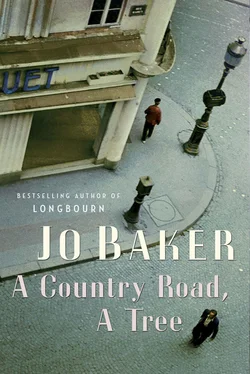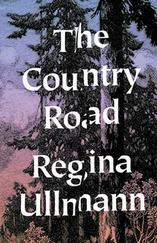The darkness rushes by outside; his bag is hot under his hands. The torn half-sheet of typescript lies between two pages of his manuscript translation. And even through the heft of those pages, that one paragraph fizzes. It is charged like nothing else that he has ever written.
“I’ll be back by curfew,” he’d promised Suzanne.
“You better had be.”
And she had kissed him, and held him for a moment; then she had broken away and clattered up the steps into the little gallery bedroom and set about straightening up the bed. And he had closed the door on her and gone.
—
He climbs up the steps now at Denfert-Rochereau, out under the organic arch, blinking into the low sun. Head up but not too up; shoulders down but not too down. Walk as if it’s no effort whatsoever. Though his body is a puppet handed to an idiot. All jerks and tweaks and janglings. Nothing is easy or natural any more.
The air is clean up here at Montsouris — there’s so little fuel nowadays, so little traffic — and the late-afternoon autumn sun gives a nostalgic softness to the day. In this part of town there’s not the scruff-and-scramble of his stretch of the rue de Vaugirard, where a stranger can blend into the bustle; this area is terribly nice and so terribly quiet: he is as exposed as a louse on a bald head.
His heart is pounding by the time he finds the place. Up in the lift — thank God for the lift, so that he can breathe and breathe and breathe, and hold up his hand and watch it shake and will it not to shake, and find that his will has no effect at all on the shaking of his hand. He wishes for a bonbon, a bit of coltsfoot rock to suck, for the comfort of sugar. Ah, the girls, the almost-nieces. The tangled hair and T-bar shoes. Where are they now, this moment, as he stands at the strange apartment door and lifts his shaking hand and knocks in the particular way that he’s been taught to knock? Are they safe? For a moment there is no response to his knock, and he thinks, dreadfully, that he will have to go all the way back to the rue des Favorites with that bit of paper scorching a hole in his bag and melting the flesh off his leg. But then the door opens a crack, and there’s a smooth young handsome face, and big dark eyes studying him.
“Yes?”
“Jimmy?” he asks. “Jimmy the Greek?”
The young man says, blank, “Where’s Moby?”
“He can’t make it. I’m…I’m the Irishman, he must have said. I’ve got the…” He holds up the bag.
The eyes flash wide. “Mother of God. Don’t tell the whole fucking floor!”
Then the door is opened fully, and he is swiped at to come in.
—
Jimmy the Greek — his name’s not Jimmy and he’s not really Greek — double-locks the door behind them.
“Right then, let’s have it.”
He rests the bag on a knee, fumbles out the manuscript and shuffles the little half-sheet of tellière out from between the pages. Jimmy takes the paper off him. It must weigh almost nothing, but he’s lighter for it, instantly.
“You should hang around a while.” Jimmy’s already heading off down the corridor, the paper hanging like a bit of litter from his hand. “So it doesn’t look so much like a delivery.”
Down at the far end of the hall, Jimmy opens a door on to a heap of domestic clutter: brooms, mops, buckets, oilskins and duster-coats, tins, a pair of broken boots. Close up, there’s a reek of mothballs and shoe polish and borax and paint. A broom shifted out of the way, Jimmy drags the coats aside, and where there should be the back wall of the cupboard, there’s a void. Photographic gear is ranged on the shelves, bottles and trays are laid out on a card-table. A little botched-together darkroom. Jimmy reaches inside, lifts down his camera. With all the cleaning products, even the smell of photographic chemicals will be masked.
“Used to be a hobby of mine,” Jimmy says, and shrugs, because now it could get him tortured, and then shot.
In the main room of the apartment, the high windows are hung with voile, screening the room and letting in a cool white light. The young man’s hands are deft as he works, clearing the table, smoothing out the white cloth. The cruciform grey shadow of the window frame lies across it. Then, nearby, a floorboard creaks. He swings round — the dividing doors are blank behind him.
“Who else is here?”
“Nobody.”
Then a truck roars along the avenue below, and Jimmy bends over the document with his camera, and the shutter clicks, and the autumn sun and the shadows and a moment’s silent time and the words that he has sifted out of all those other words on the paper slips, the words that he has decided are the ones that matter most, the words that he has typed out with his pecking fingertips— Scharnhorst, Gneisenau, Prinz Eugen, Brest —are captured on film.
—
When it happens, it happens by accident. They stumble their way into sex, too cold, too tired, too hungry to set out for it deliberately, and yet too starved of other pleasures to deny themselves or each other this. Sex has become more acquiescence than an active choice; a why not shrug, rather than an urgent yes.
Few clothes come off. Perhaps a scarf, but only when it twists too tight and a little slackness must be tugged into it before things can continue. Buttons are undone. Fabric is parted, rucked up, pushed aside. Only what is necessary is uncovered; there is no will or energy for more. Underneath the clothes, new downy hair is growing on slack skin. Fleshless, the body insulates itself against the cold.
Movement disarranges the blankets; skin prickles with gooseflesh. She grumbles, tugs at the covers. He mumbles an apology and rolls away from her, and she sighs, and it is over, and it will have to do.
Planes climb into the sky; they grind over the chalky hills and crumbling shores and out over the creases of the waves; glazed with starlight, their muzzles slip through banks of muffling cloud, and back into the clear. They press towards the lip of this other land, where it juts into the sea.
The two of them lie in stillness, spent. The wet of his eyes is cold when he blinks in the darkness. The apartment is quiet. The street outside is quiet, after curfew; nobody is about. They breathe. Underneath the blankets, she tugs her skirt back down again. He pulls his combinations back and buttons up. They lie unspeaking, thoughts chewing on themselves.
Three hundred and twelve miles away, the night is torn in shreds; it streams with flame, and metal screams and splits, and bricks slither, and the water burns.
And he lies awake. He blinks up at the ceiling. She turns on her hip and is breathing softly into sleep. His thoughts are tangled, will not resolve themselves. Hunger and fatigue and the ache in his chest, and the cold and the old man in the song, dancing barefoot on the ice. And the harm that might come. From what he’s done, from the words that he has chosen, and for the direction in which he has sent them.
—
Alfy brings the papers.
The papers pile up, and fill the drawer, and lie there dry and silent as fallen leaves. He spills them on his table, slides the scraps around. Matching them. Finding echoes. Looking for patterns. He translates, redacts, transcribes. He burns up the little slips. He takes the document to Montsouris, to be photographed, or Alfy takes it.
And Alfy brings more papers.
The papers pile up in the drawer. He pours them out, shuffles them around, a puzzle to be solved.
They go on as normal. They don’t change anything. They go to concerts together at the Opéra; he takes himself off to exhibitions. He buys a new notebook — a pre-war, silken thing — and tries to write. He goes to see Alfy, because he’s always gone to see Alfy. From time to time he passes the same man on the landing or stairs. A priest: fleshy smile, black soutane and an incongruous whiff of cigars. He doesn’t think to mention it to Alfy. There are many other apartments in the building; most likely a priest would be calling on somebody else. Life becomes a parody of itself: the walk to the shops, the drink in a café, the sketchy meals taken together, the conversations about anything other than what presses hardest on them. It is all self-conscious and unreal: there is always the possibility of an audience; everything is open to scrutiny and question. As he considers, in the Galerie Louis Carré, hands behind his back, some recent paintings by Rouault, he knows that he too might also be considered. The pictures are few and small and good, and he is captured by L’Hiver, where the roads are white and the land is dun and yet seems to be back-lit, glowing; the trees stand like gibbets by the roadside; figures trudge through the winter landscape, heads bent and hooded, rag-shod, all in couples apart from one shambling man who trudges off alone. The world is cold. He closes his eyes; the image is there like the afterburn from a bright window, exquisitely bleak. He takes a deliberate moment to remember it, to store up its loveliness. He is hoarding. These are famine times.
Читать дальше










